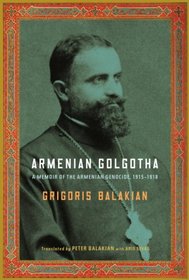Search -
Armenian Golgotha
Armenian Golgotha
Author:
Never before in English, Armenian Golgotha is the most dramatic and comprehensive eyewitness account of the first modern genocide. — On April 24, 1915, the priest Grigoris Balakian was arrested along with some 250 other intellectuals and leaders of Constantinople?s Armenian community. It was the beginning of the Ottoman Turkish government?... more »
Author:
Never before in English, Armenian Golgotha is the most dramatic and comprehensive eyewitness account of the first modern genocide. — On April 24, 1915, the priest Grigoris Balakian was arrested along with some 250 other intellectuals and leaders of Constantinople?s Armenian community. It was the beginning of the Ottoman Turkish government?... more »
ISBN-13: 9780307262882
ISBN-10: 030726288X
Publication Date: 3/31/2009
Pages: 560
Rating: ?
ISBN-10: 030726288X
Publication Date: 3/31/2009
Pages: 560
Rating: ?
0 stars, based on 0 rating
Publisher: Knopf
Book Type: Hardcover
Other Versions: Paperback
Members Wishing: 2
Reviews: Amazon | Write a Review
Book Type: Hardcover
Other Versions: Paperback
Members Wishing: 2
Reviews: Amazon | Write a Review
Genres:
- Biographies & Memoirs >> Historical
- Biographies & Memoirs >> Memoirs
- History >> Asia >> Armenia
- History >> Asia >> Turkey
- History >> World
- History >> Modern (16th-21st Centuries) >> 20th Century




